Maritime Business: Incoterms Rules, Obligations, and Options
VerifiedAdded on 2023/01/13
|6
|1357
|35
Report
AI Summary
This report provides a detailed analysis of Incoterms rules within the context of maritime business. It emphasizes the importance of clearly defining Incoterms in contracts, especially referencing Incoterms 2010. The report outlines the significance of choosing the correct Incoterm based on the goods and transportation method. It covers various Incoterms such as Ex Works (EXW), Free Carrier (FCA), and others, explaining how they impact the transfer of risk and obligations between parties. It highlights the importance of specifying the port or place of delivery and clarifies that Incoterms do not constitute a complete sales contract, as they do not cover payment methods or breach of contract consequences. The report also discusses specific obligations under EXW, detailing the seller's responsibilities (delivery of goods and documents) and the buyer's responsibilities (payment and obtaining licenses). The document stresses the need to be aware of local laws that may override Incoterms and provides a comprehensive overview of the rules and classifications. It also includes a reference list of sources used.
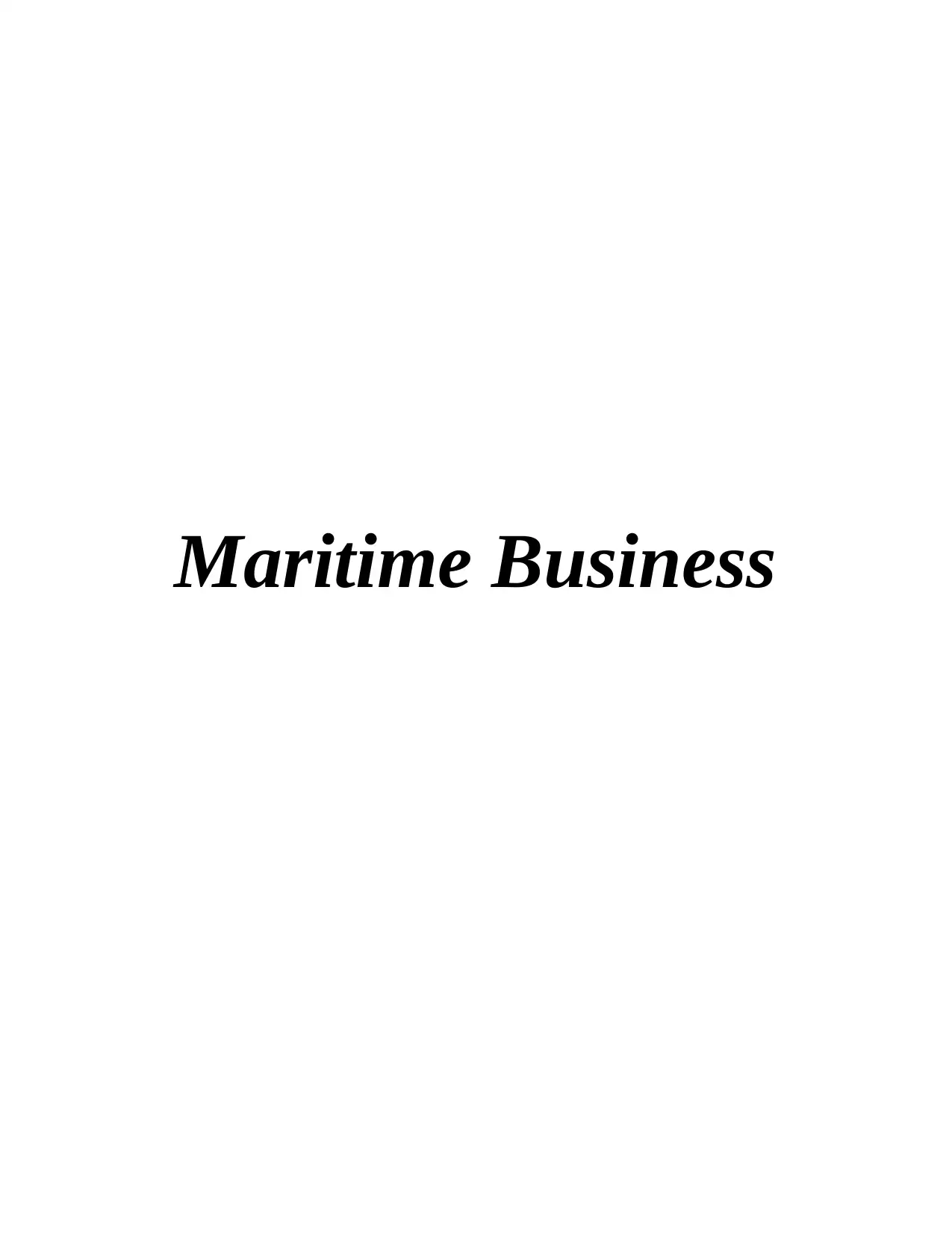
Maritime Business
Paraphrase This Document
Need a fresh take? Get an instant paraphrase of this document with our AI Paraphraser
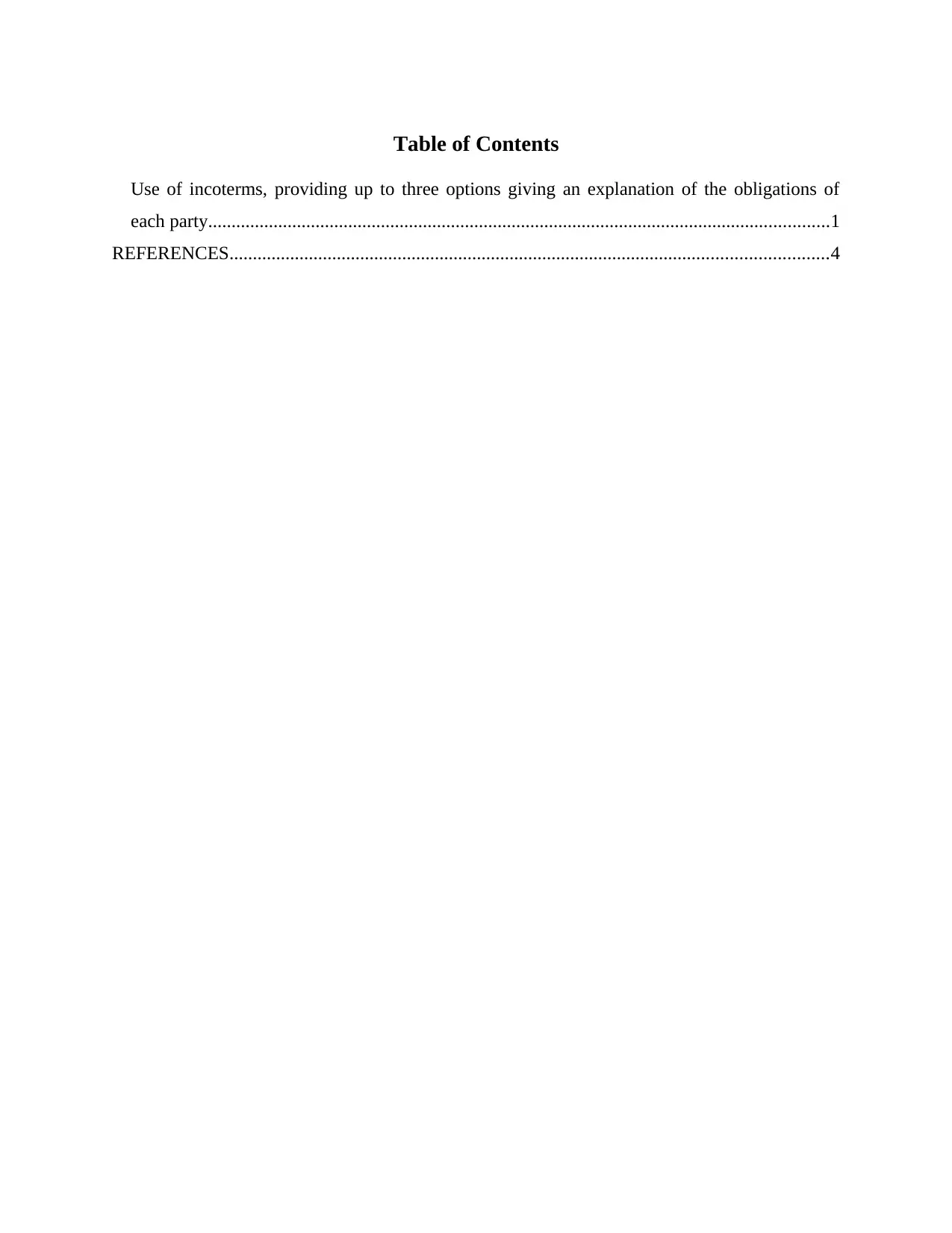
Table of Contents
Use of incoterms, providing up to three options giving an explanation of the obligations of
each party.....................................................................................................................................1
REFERENCES................................................................................................................................4
Use of incoterms, providing up to three options giving an explanation of the obligations of
each party.....................................................................................................................................1
REFERENCES................................................................................................................................4
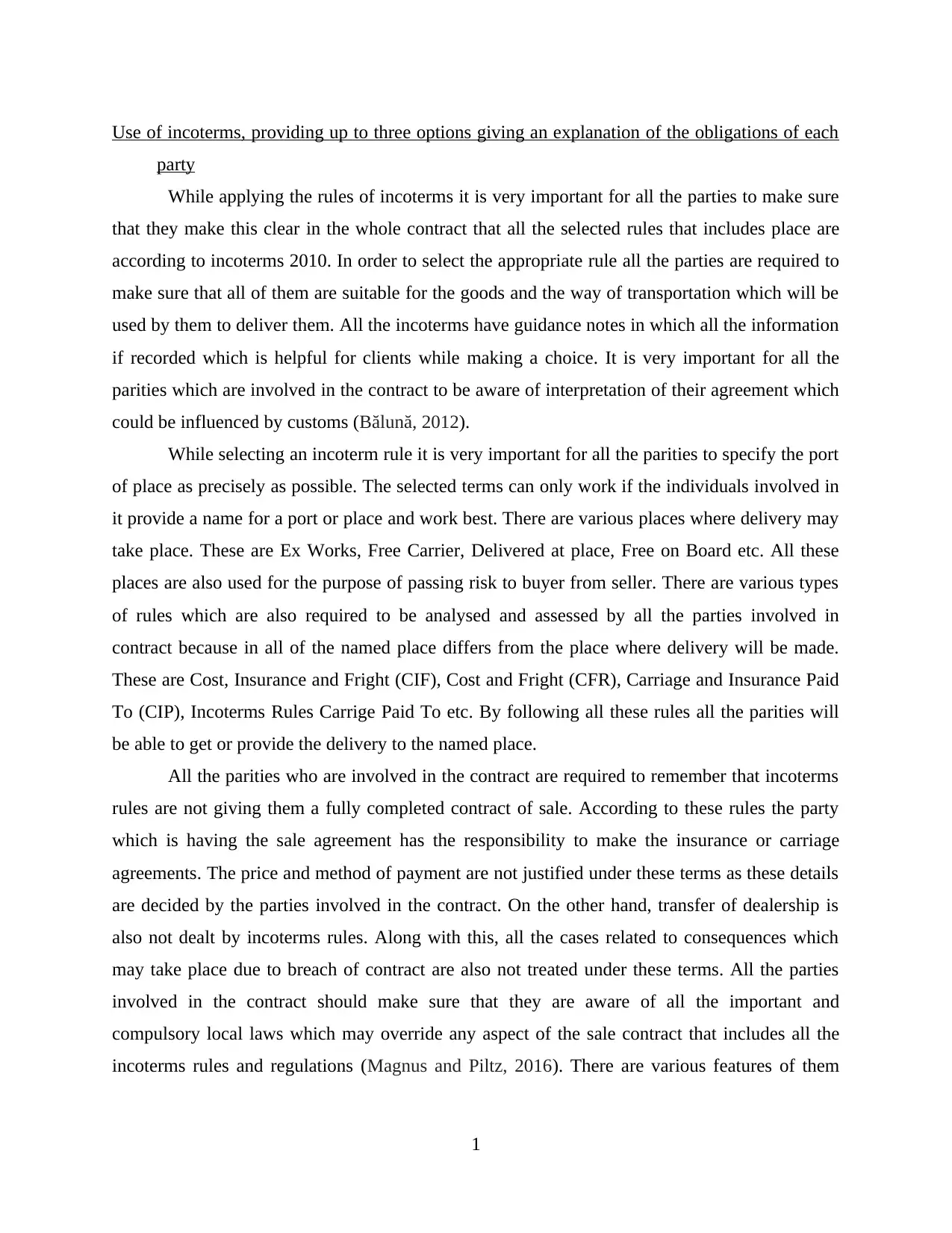
Use of incoterms, providing up to three options giving an explanation of the obligations of each
party
While applying the rules of incoterms it is very important for all the parties to make sure
that they make this clear in the whole contract that all the selected rules that includes place are
according to incoterms 2010. In order to select the appropriate rule all the parties are required to
make sure that all of them are suitable for the goods and the way of transportation which will be
used by them to deliver them. All the incoterms have guidance notes in which all the information
if recorded which is helpful for clients while making a choice. It is very important for all the
parities which are involved in the contract to be aware of interpretation of their agreement which
could be influenced by customs (Bălună, 2012).
While selecting an incoterm rule it is very important for all the parities to specify the port
of place as precisely as possible. The selected terms can only work if the individuals involved in
it provide a name for a port or place and work best. There are various places where delivery may
take place. These are Ex Works, Free Carrier, Delivered at place, Free on Board etc. All these
places are also used for the purpose of passing risk to buyer from seller. There are various types
of rules which are also required to be analysed and assessed by all the parties involved in
contract because in all of the named place differs from the place where delivery will be made.
These are Cost, Insurance and Fright (CIF), Cost and Fright (CFR), Carriage and Insurance Paid
To (CIP), Incoterms Rules Carrige Paid To etc. By following all these rules all the parities will
be able to get or provide the delivery to the named place.
All the parities who are involved in the contract are required to remember that incoterms
rules are not giving them a fully completed contract of sale. According to these rules the party
which is having the sale agreement has the responsibility to make the insurance or carriage
agreements. The price and method of payment are not justified under these terms as these details
are decided by the parties involved in the contract. On the other hand, transfer of dealership is
also not dealt by incoterms rules. Along with this, all the cases related to consequences which
may take place due to breach of contract are also not treated under these terms. All the parties
involved in the contract should make sure that they are aware of all the important and
compulsory local laws which may override any aspect of the sale contract that includes all the
incoterms rules and regulations (Magnus and Piltz, 2016). There are various features of them
1
party
While applying the rules of incoterms it is very important for all the parties to make sure
that they make this clear in the whole contract that all the selected rules that includes place are
according to incoterms 2010. In order to select the appropriate rule all the parties are required to
make sure that all of them are suitable for the goods and the way of transportation which will be
used by them to deliver them. All the incoterms have guidance notes in which all the information
if recorded which is helpful for clients while making a choice. It is very important for all the
parities which are involved in the contract to be aware of interpretation of their agreement which
could be influenced by customs (Bălună, 2012).
While selecting an incoterm rule it is very important for all the parities to specify the port
of place as precisely as possible. The selected terms can only work if the individuals involved in
it provide a name for a port or place and work best. There are various places where delivery may
take place. These are Ex Works, Free Carrier, Delivered at place, Free on Board etc. All these
places are also used for the purpose of passing risk to buyer from seller. There are various types
of rules which are also required to be analysed and assessed by all the parties involved in
contract because in all of the named place differs from the place where delivery will be made.
These are Cost, Insurance and Fright (CIF), Cost and Fright (CFR), Carriage and Insurance Paid
To (CIP), Incoterms Rules Carrige Paid To etc. By following all these rules all the parities will
be able to get or provide the delivery to the named place.
All the parities who are involved in the contract are required to remember that incoterms
rules are not giving them a fully completed contract of sale. According to these rules the party
which is having the sale agreement has the responsibility to make the insurance or carriage
agreements. The price and method of payment are not justified under these terms as these details
are decided by the parties involved in the contract. On the other hand, transfer of dealership is
also not dealt by incoterms rules. Along with this, all the cases related to consequences which
may take place due to breach of contract are also not treated under these terms. All the parties
involved in the contract should make sure that they are aware of all the important and
compulsory local laws which may override any aspect of the sale contract that includes all the
incoterms rules and regulations (Magnus and Piltz, 2016). There are various features of them
1
⊘ This is a preview!⊘
Do you want full access?
Subscribe today to unlock all pages.

Trusted by 1+ million students worldwide
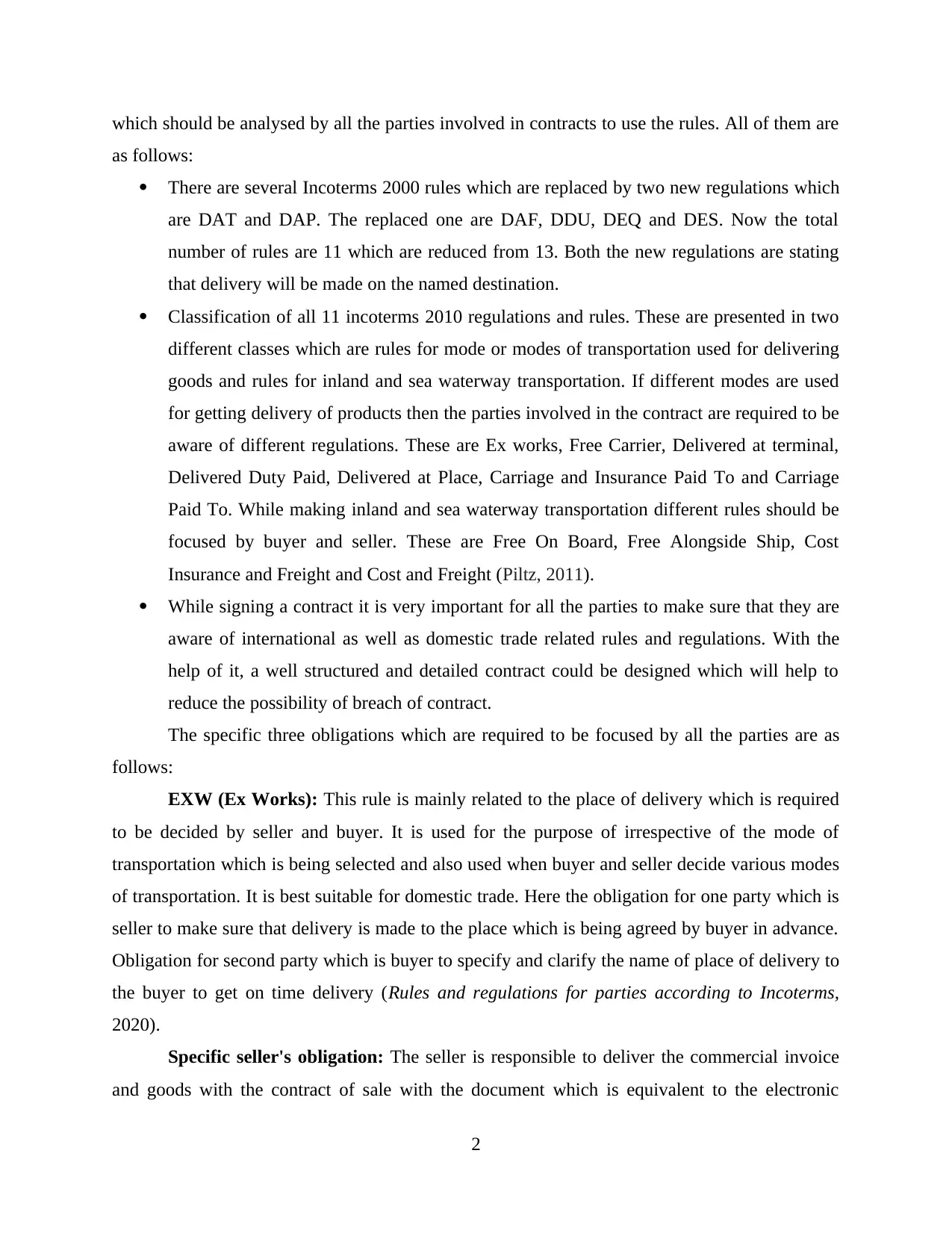
which should be analysed by all the parties involved in contracts to use the rules. All of them are
as follows:
There are several Incoterms 2000 rules which are replaced by two new regulations which
are DAT and DAP. The replaced one are DAF, DDU, DEQ and DES. Now the total
number of rules are 11 which are reduced from 13. Both the new regulations are stating
that delivery will be made on the named destination.
Classification of all 11 incoterms 2010 regulations and rules. These are presented in two
different classes which are rules for mode or modes of transportation used for delivering
goods and rules for inland and sea waterway transportation. If different modes are used
for getting delivery of products then the parties involved in the contract are required to be
aware of different regulations. These are Ex works, Free Carrier, Delivered at terminal,
Delivered Duty Paid, Delivered at Place, Carriage and Insurance Paid To and Carriage
Paid To. While making inland and sea waterway transportation different rules should be
focused by buyer and seller. These are Free On Board, Free Alongside Ship, Cost
Insurance and Freight and Cost and Freight (Piltz, 2011).
While signing a contract it is very important for all the parties to make sure that they are
aware of international as well as domestic trade related rules and regulations. With the
help of it, a well structured and detailed contract could be designed which will help to
reduce the possibility of breach of contract.
The specific three obligations which are required to be focused by all the parties are as
follows:
EXW (Ex Works): This rule is mainly related to the place of delivery which is required
to be decided by seller and buyer. It is used for the purpose of irrespective of the mode of
transportation which is being selected and also used when buyer and seller decide various modes
of transportation. It is best suitable for domestic trade. Here the obligation for one party which is
seller to make sure that delivery is made to the place which is being agreed by buyer in advance.
Obligation for second party which is buyer to specify and clarify the name of place of delivery to
the buyer to get on time delivery (Rules and regulations for parties according to Incoterms,
2020).
Specific seller's obligation: The seller is responsible to deliver the commercial invoice
and goods with the contract of sale with the document which is equivalent to the electronic
2
as follows:
There are several Incoterms 2000 rules which are replaced by two new regulations which
are DAT and DAP. The replaced one are DAF, DDU, DEQ and DES. Now the total
number of rules are 11 which are reduced from 13. Both the new regulations are stating
that delivery will be made on the named destination.
Classification of all 11 incoterms 2010 regulations and rules. These are presented in two
different classes which are rules for mode or modes of transportation used for delivering
goods and rules for inland and sea waterway transportation. If different modes are used
for getting delivery of products then the parties involved in the contract are required to be
aware of different regulations. These are Ex works, Free Carrier, Delivered at terminal,
Delivered Duty Paid, Delivered at Place, Carriage and Insurance Paid To and Carriage
Paid To. While making inland and sea waterway transportation different rules should be
focused by buyer and seller. These are Free On Board, Free Alongside Ship, Cost
Insurance and Freight and Cost and Freight (Piltz, 2011).
While signing a contract it is very important for all the parties to make sure that they are
aware of international as well as domestic trade related rules and regulations. With the
help of it, a well structured and detailed contract could be designed which will help to
reduce the possibility of breach of contract.
The specific three obligations which are required to be focused by all the parties are as
follows:
EXW (Ex Works): This rule is mainly related to the place of delivery which is required
to be decided by seller and buyer. It is used for the purpose of irrespective of the mode of
transportation which is being selected and also used when buyer and seller decide various modes
of transportation. It is best suitable for domestic trade. Here the obligation for one party which is
seller to make sure that delivery is made to the place which is being agreed by buyer in advance.
Obligation for second party which is buyer to specify and clarify the name of place of delivery to
the buyer to get on time delivery (Rules and regulations for parties according to Incoterms,
2020).
Specific seller's obligation: The seller is responsible to deliver the commercial invoice
and goods with the contract of sale with the document which is equivalent to the electronic
2
Paraphrase This Document
Need a fresh take? Get an instant paraphrase of this document with our AI Paraphraser
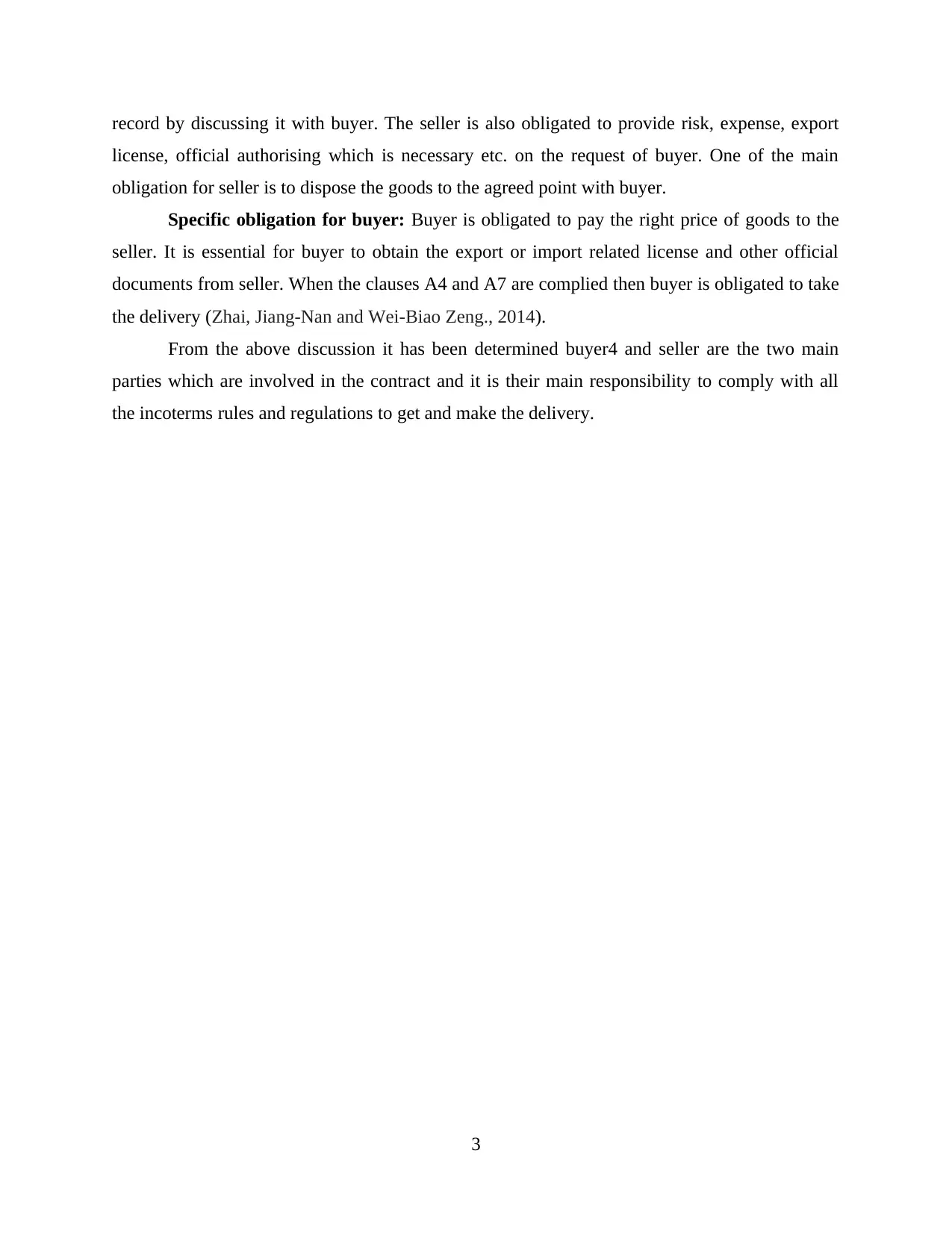
record by discussing it with buyer. The seller is also obligated to provide risk, expense, export
license, official authorising which is necessary etc. on the request of buyer. One of the main
obligation for seller is to dispose the goods to the agreed point with buyer.
Specific obligation for buyer: Buyer is obligated to pay the right price of goods to the
seller. It is essential for buyer to obtain the export or import related license and other official
documents from seller. When the clauses A4 and A7 are complied then buyer is obligated to take
the delivery (Zhai, Jiang-Nan and Wei-Biao Zeng., 2014).
From the above discussion it has been determined buyer4 and seller are the two main
parties which are involved in the contract and it is their main responsibility to comply with all
the incoterms rules and regulations to get and make the delivery.
3
license, official authorising which is necessary etc. on the request of buyer. One of the main
obligation for seller is to dispose the goods to the agreed point with buyer.
Specific obligation for buyer: Buyer is obligated to pay the right price of goods to the
seller. It is essential for buyer to obtain the export or import related license and other official
documents from seller. When the clauses A4 and A7 are complied then buyer is obligated to take
the delivery (Zhai, Jiang-Nan and Wei-Biao Zeng., 2014).
From the above discussion it has been determined buyer4 and seller are the two main
parties which are involved in the contract and it is their main responsibility to comply with all
the incoterms rules and regulations to get and make the delivery.
3
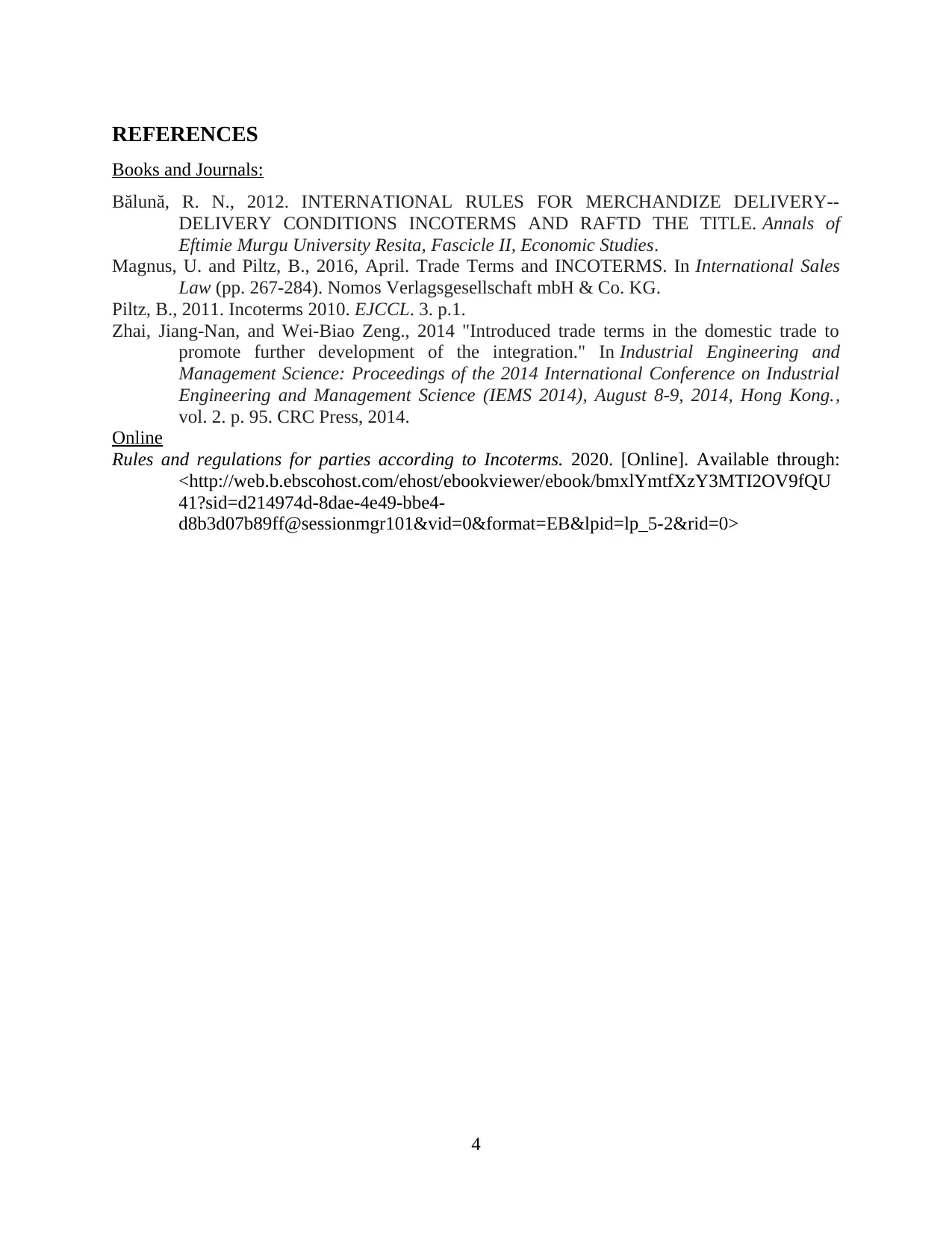
REFERENCES
Books and Journals:
Bălună, R. N., 2012. INTERNATIONAL RULES FOR MERCHANDIZE DELIVERY--
DELIVERY CONDITIONS INCOTERMS AND RAFTD THE TITLE. Annals of
Eftimie Murgu University Resita, Fascicle II, Economic Studies.
Magnus, U. and Piltz, B., 2016, April. Trade Terms and INCOTERMS. In International Sales
Law (pp. 267-284). Nomos Verlagsgesellschaft mbH & Co. KG.
Piltz, B., 2011. Incoterms 2010. EJCCL. 3. p.1.
Zhai, Jiang-Nan, and Wei-Biao Zeng., 2014 "Introduced trade terms in the domestic trade to
promote further development of the integration." In Industrial Engineering and
Management Science: Proceedings of the 2014 International Conference on Industrial
Engineering and Management Science (IEMS 2014), August 8-9, 2014, Hong Kong.,
vol. 2. p. 95. CRC Press, 2014.
Online
Rules and regulations for parties according to Incoterms. 2020. [Online]. Available through:
<http://web.b.ebscohost.com/ehost/ebookviewer/ebook/bmxlYmtfXzY3MTI2OV9fQU
41?sid=d214974d-8dae-4e49-bbe4-
d8b3d07b89ff@sessionmgr101&vid=0&format=EB&lpid=lp_5-2&rid=0>
4
Books and Journals:
Bălună, R. N., 2012. INTERNATIONAL RULES FOR MERCHANDIZE DELIVERY--
DELIVERY CONDITIONS INCOTERMS AND RAFTD THE TITLE. Annals of
Eftimie Murgu University Resita, Fascicle II, Economic Studies.
Magnus, U. and Piltz, B., 2016, April. Trade Terms and INCOTERMS. In International Sales
Law (pp. 267-284). Nomos Verlagsgesellschaft mbH & Co. KG.
Piltz, B., 2011. Incoterms 2010. EJCCL. 3. p.1.
Zhai, Jiang-Nan, and Wei-Biao Zeng., 2014 "Introduced trade terms in the domestic trade to
promote further development of the integration." In Industrial Engineering and
Management Science: Proceedings of the 2014 International Conference on Industrial
Engineering and Management Science (IEMS 2014), August 8-9, 2014, Hong Kong.,
vol. 2. p. 95. CRC Press, 2014.
Online
Rules and regulations for parties according to Incoterms. 2020. [Online]. Available through:
<http://web.b.ebscohost.com/ehost/ebookviewer/ebook/bmxlYmtfXzY3MTI2OV9fQU
41?sid=d214974d-8dae-4e49-bbe4-
d8b3d07b89ff@sessionmgr101&vid=0&format=EB&lpid=lp_5-2&rid=0>
4
⊘ This is a preview!⊘
Do you want full access?
Subscribe today to unlock all pages.

Trusted by 1+ million students worldwide
1 out of 6
Related Documents
Your All-in-One AI-Powered Toolkit for Academic Success.
+13062052269
info@desklib.com
Available 24*7 on WhatsApp / Email
![[object Object]](/_next/static/media/star-bottom.7253800d.svg)
Unlock your academic potential
Copyright © 2020–2025 A2Z Services. All Rights Reserved. Developed and managed by ZUCOL.





